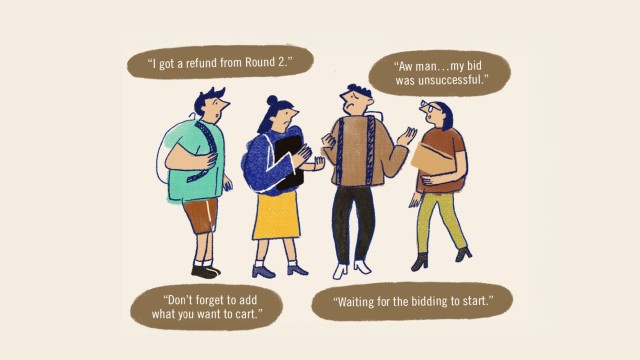How To Bid Like a BOSS
An acronym for ‘SMU Bidding Online SyStem’, SMU BOSS is a bidding system for SMU undergraduate students to enrol for classes. At the start of each semester, students are provided credits to bid for modules. Read to find out more about how the system works, as well as practical tips to secure the classes of your choice.
If you are an incoming SMU student who has not yet figured out what to make of the bidding culture that you have heard so much about at SMU, this article could just be the thing you need as you start your freshman year!
An acronym for ‘SMU Bidding Online SyStem’, SMU BOSS is a bidding system for SMU undergraduate students which allows you to enrol for your classes. Students use e-credits to bid for modules and the system enrols the highest bidders into each of the classes. Sounds exciting? Read on for some very practical and useful tips on how you can ace the system and bid your way to success.

How to obtain bidding credits
At the start of every semester, each student is given e$115. Unused credits are brought over to the next semester, therefore by spending less each round, you can save up to bid for pricier modules next time.
A protip here to get more bidding credits is to keep a lookout for emails from the SMU Students’ Association (SMUSA) and the Centre for Teaching Excellence every semester. Completing the following surveys will earn you bonus credits:
Centre for Teaching Excellence Course Feedback: e$10
SMUSA Student Survey: e$5
Student Pulse Survey: e$3
Bidding dates
To allow students to secure their desired modules each term, there are multiple bidding rounds made available in each bidding exercise. Make sure to take note of the SMU bidding dates so you don’t miss a bidding round! SMU bidding dates for the current school semester can be found on your SMU BOSS home page. To view all the bidding dates, log in to the system and click on ‘More’ as shown here:
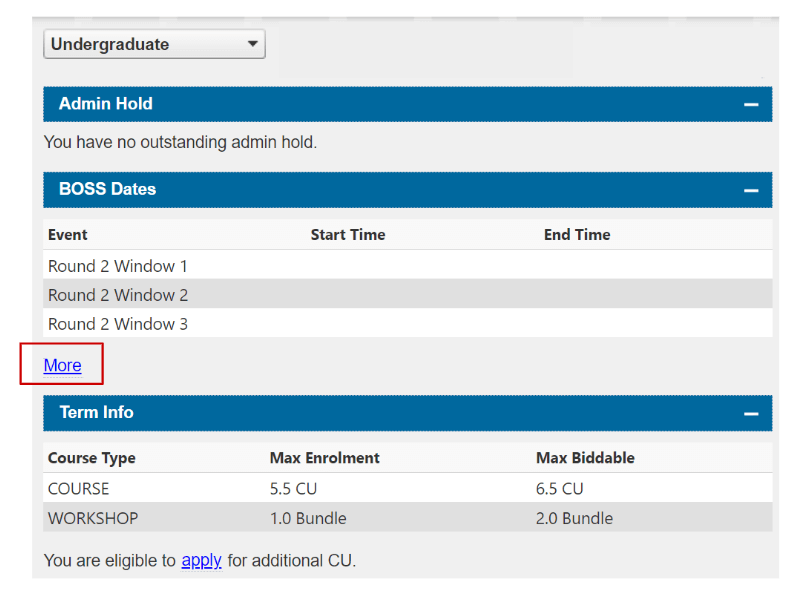
The bidding period for each semester stretches beyond a month but is divided into Rounds and Windows. There are different rules for different Rounds, as illustrated in this table:
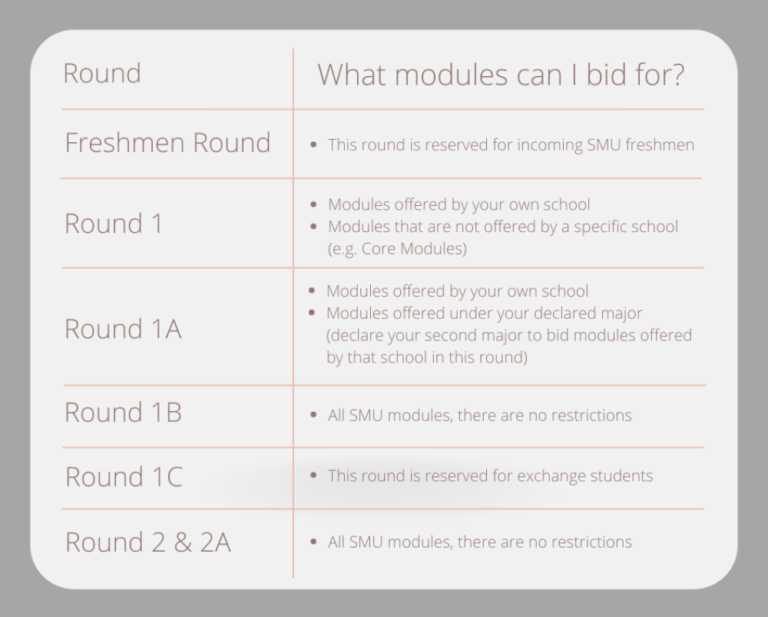
A recent update to the system is that before Round 1 starts, you may apply to swap your pre-assigned course section with another section of the same course that has a different day and/or timing. If a mutual swap is possible, you will be notified of the class swap outcome one working day before Round 1 commences.
How to plan your SMU modules
First, you will need to familiarise yourself with the term ‘baskets’ which refers to the different sections of modules that students need to fulfil before they can graduate. You can find out which modules and how many you need to clear for each basket in the SMU Student Handbook. Although a ‘handbook’ sounds tacky, I promise you’ll find this one useful!
Next, after getting a good idea of the different requirements you need to fulfil, you can go to Course Offerings to check what is offered in the current semester, and use this list to plan your modules before the BOSS bidding portal is open.
Another useful tool is Course Sequence, under ‘Quick Links’ in SMU BOSS. Course Sequence is a table provided by the university that suggests when, in which year, you should take certain SMU modules.
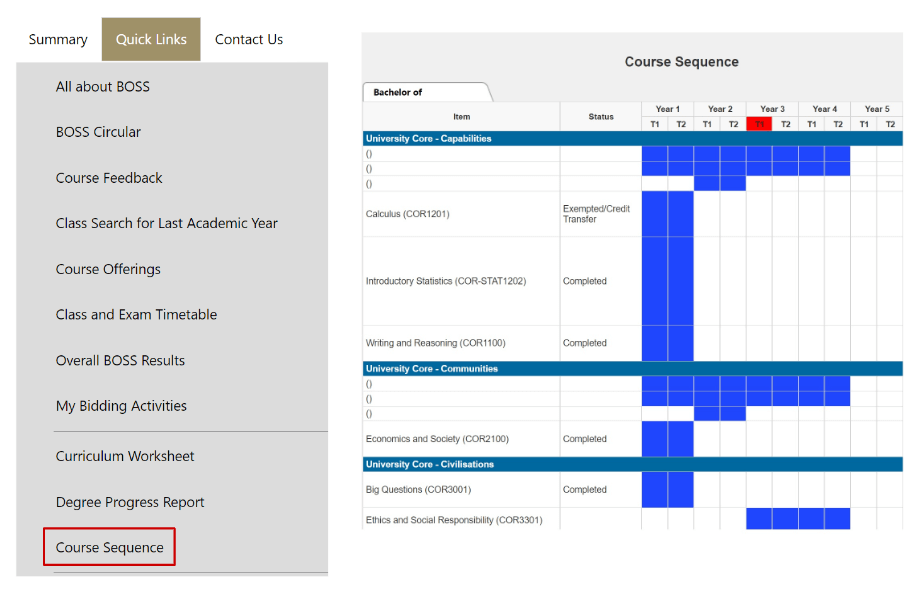
Additionally, if you wish to plan ahead for your entire University journey, you can go to Degree Progress Report What-if, a self-service application on SMU Oasis.
On this page, you can create a list of all the SMU modules you wish to take for the next four years and the report will tell you if these modules fulfil the requirements needed for your major, and what else you will need to graduate.

Which class section should I take?
After planning the modules to take, select a class section that suits you best. To do this, it will help to know where your strengths lie, since different class sections are taught by different professors, and each professor has a different grading standard.
Here is one rather extreme but real example taken from SMU BOSS; the tables below show the assessment component breakdowns for the same module that are taught by two different professors.
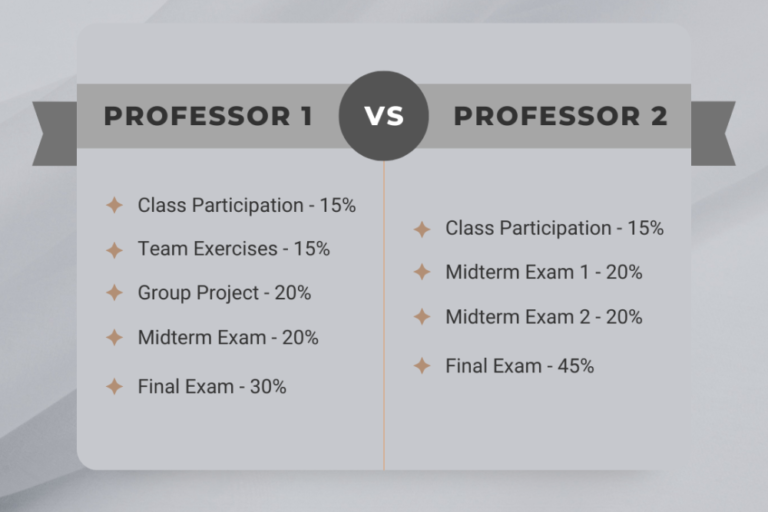
As you can see, Professor 1 assesses students on various aspects while Professor 2’s grading is heavily exam-focused. Selecting an assessment style that better suits your strengths and preferences is something you may want to consider too when choosing your class sections.
How to best estimate your bids
To estimate how much you should bid for the modules you’re keen on, there are three important components to consider – Past Years’ BOSS Bids, Time, and Availability.
Past Years’ BOSS Biddings
Firstly, knowing Past Years’ BOSS Biddings are the most important because they give you a gauge of the range you should be bidding at to make the best use of your e$.
Past years’ minimum and median bids can be found on either the SMU BOSS page, under ‘Quick Links -> Overall BOSS Results’, or at ‘AfterClass’ – a student group-made platform that compiles the bids into visually appealing graphs.
The minimum bid amount is e$10 for each module, with the incremental value being e$0.01. This means you can bid a course for e$10.01, e$12.57, etc.
A general rule of thumb passed down by SMU seniors is to bid slightly above the median to safely secure the module. However, doing so could be taxing on your e-wallet, and you may need to make riskier bets for the less important modules to save up to secure key ones.
Time
Next, Time refers to when the classes are held, as different class timings have different price trends. If you are an early bird, there is good news for you, as the earlier classes tend to be cheaper.
For instance, here is the price breakdown of a module based on timing, ceteris paribus:
Morning Classes (8.15am – 11.30am): Less popular, cheaper
Afternoon Classes (12pm – 3.15pm): More popular, more expensive
Evening Classes (3.30pm – 6.45pm): More popular, more expensive
Night Classes (7pm – 10.15pm): Rare and fluctuates, depends on other factors
Availability
Finally, Availability refers to the number of classes offered that semester and how many slots are open in the window you are bidding. When checking past semesters’ bids, compare the number of classes and slots available in previous years versus the current year’s. The larger the vacancy, the lower you may wish to adjust your bids to save some credits.
Vice versa, if there are fewer classes this semester compared to the previous, you will likely need to bid higher than the previous semester’s price range if you want to secure the module.
Also, keep in mind that the system won’t allow you to bid for multiple classes of the same course, as well as courses with timetable clashes.
Advanced SMU BOSS bidding strategy
Worried that your bids may fail and looking for backups? Let me introduce to you DICE.
DICE is a tool available on the BOSS bidding page which stands for Drop If Course Exceeds, and it is to be assigned to the module you are least interested in getting. When you “DICE a module”, the system will automatically drop you from the class if your number of successful bids exceeds the number you are allowed to take. However, if you fail one of your main bids, the system will keep your enrollment for this class.
For more information on DICE, visit OASIS > BOSS Bidding > Course Enrolment & Drop > All about BOSS.
Frequently asked questions
Q:
What is the recommended number of modules to take in one semester?
A:
Four to five. Strategically, you can plan heavier modules when taking four modules and have some lighter ones when taking five modules.
Q:
Is there a higher chance of getting my bid if I bid earlier?
A:
No, the BOSS bidding system does not allocate classes on a first-come, first-served basis.
Q:
Why do some module titles say ‘(SMU-X)’?
A:
SMU-X are modules that require you to work on a project with a real external client, where you’ll stand to gain useful industry experience. Do bear in mind these courses have heavier workload, so you’ll need to plan your time well.
Q:
What is one thing seniors wish they knew?
A:
A tip from seniors: double count your modules in your freshman round if you can. This means completing a module that can clear requirements from two baskets.
An example for this is the Climate Change: Global and Local Solutions module, which can fulfil the Tech & Society and Singapore Studies basket requirements. Clearing requirements quicker gives you leeway to take up other interesting electives later on. View the latest Course Offerings to find out which modules can be double-counted.
However these modules in SMU are limited and highly sought after, so they tend to be more expensive. If they are offered in your freshman BOSS bidding rounds and you have enough e$ credit to spare, it’s better to secure the bids for these modules during freshmen rounds because competition will be higher later.
Q:
Can my friend transfer their e$ credits to me?
A:
No, transfer of credits between students is not allowed.
Q:
What if I fail all my bids?
A:
Continue trying until all the rounds are over. If you are still unable to get a module by then, send an email to the university to see what can be done.
Q:
Will credits be refunded when I drop a class?
A:
Yes, but there is a maximum number of credits that can be refunded, and it depends on the round you drop them, so plan wisely to make the best use of your e$ credits.
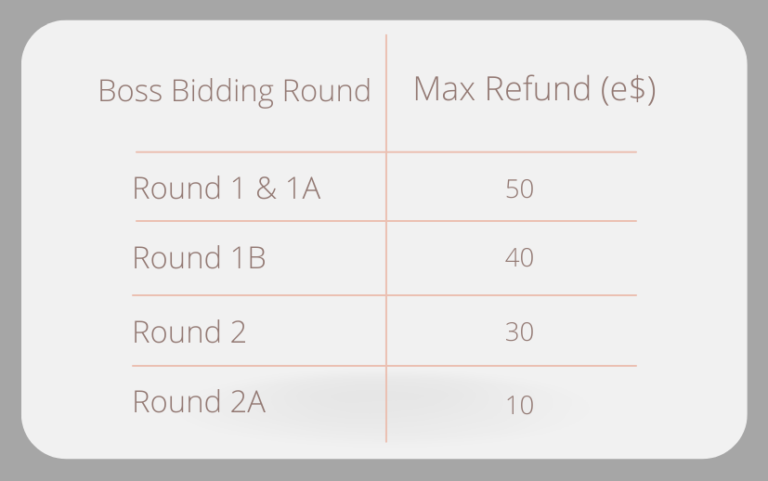
For more information and tips on module bidding, check out SMUSA’s BOSS Bidding Guidebook here.
Ready to begin your undergraduate journey? Find out more about joining SMU here.


